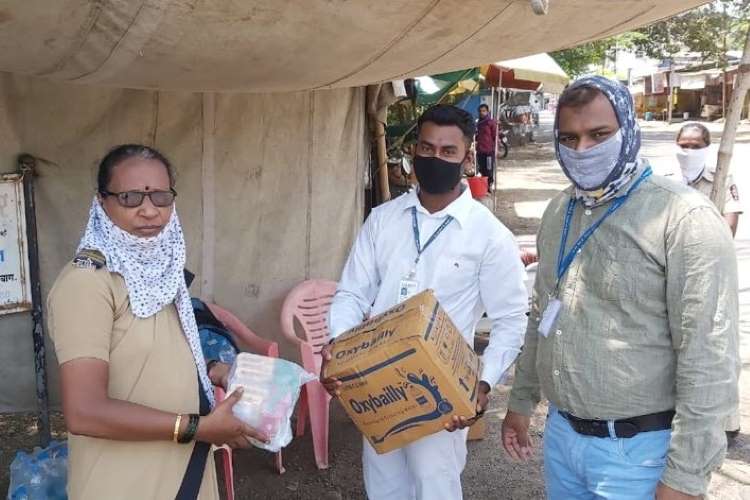(This article is the third of a four-part series on a viable strategy for India against the economic impact of the new coronavirus outbreak.)
The country has witnessed large-scale displacement and job losses due to the coronavirus outbreak and the subsequent nation-wide lockdown. Unless addressed efficiently, this could lead to a lot of misery for the poorer sections of the society. The good news is that the country has large amounts of food grains and pulses stored in Food Corporation of India godowns. The challenge is how to distribute these stocks efficiently to ensure that no one goes hungry in the country.
Here is where the strength of local bodies comes into play. The 73rd and 74th amendments to the Constitution, passed three decades ago, have provided for a three-tier system of panchayats at village, intermediate block/taluk/mandal and district levels. The local bodies are the basic units of the democratic system that comprise all adult members registered as voters. In difficult times, these representatives can supplement the efforts of the central and state governments in an efficient manner.
READ PART I: Covid-19: Government should extend the lockdown for another five weeks
PART II: MSME sector: Eight ways India can back its small enterprises
Panchayats in villages and municipal corporations in urban areas are the units of governance closest to the people. The local bodies should play an important role in the fight against the Covid-19 outbreak. Sarpanches, local corporators and mayors are in a position to identify and support the hungry, the sick and the needy. Some states have already done this exercise with great impact. Here is how local bodies could perform some key governance functions in this hour of crisis.
- Enlist the support of sarpanches/corporators and other elected representatives, as they would know the needs of the people, especially the poor, elderly and unemployed youth in their areas.
- Community kitchens can be organised by the panchayats and municipal corporations. These can be organised by each elected representative in their local areas.
- House migrant labour stuck on farms or factories in the vacant buildings of schools and colleges as well as in places of worship. These places can also serve food to the needy.
- Ensure healthcare support to the people, tapping public and private hospitals and clinics for the next three months. The elected representatives should also enlist the support of Ayurvedic doctors and Homeopaths in their areas, and can use these trained professionals for spreading literacy on facing Covid-19 while allopathic doctors carry out treatment with allopathic medicines.
- Help of para-medics, retired defence and government officials can be utilised in maintaining discipline and assisting local operations. The corporator can tap such manpower resources for safeguarding the local population.
- The success of businesses at the local area level is of paramount importance to the local representatives. Therefore, to support businesses and small & micro enterprises, local representatives can be using their services in allocation/distribution of scarce resources.
- Small and medium NBFCs generally operate in small geographical areas and local bodies can monitor their activities. In fact, local bodies can play a role in coordinating between NBFCs and SMEs to generate employment and provide revenue to local authorities. Local bodies should park their funds with local NBFCs with a direction to lend to local SMEs. This principle can also be efficiently applied to both village and cottage industry in rural areas.
- Local Bodies should be able to raise resources from local population and then spend in a more efficient manner. As local bodies and their elected representatives are closest to the people, they are held more accountable, and hence have to be careful with the allocation and use of resources.
- Local representatives through panchayats and municipal corporations can play a pivotal role in identifying the sick and potential cases of Covid-19 and provide information to hospitals, health professionals and state administration.
- Panchayats, municipal corporations, sarpanches and local representatives can serve as points of contact for flow of information from the people to the state government and vice versa. The representatives can also be made accountable and responsible for their wards to ensure that within their jurisdiction nobody suffers from hunger or diseases. Community kitchens should ensure that nobody goes hungry during this pandemic.
- Availability of food items in fair price shops should be ensured. The local bodies should be made responsible for adequate food stocks in their areas. Freight trains are operating and can be used for movement of food and dry rations from FCI godowns. The service of armed forces could be used for last mile transfer of food stocks from railway stations to fair price shops. The food from more than 5 lakh FPS in India should be made available to the local representatives on a daily basis to avoid pilferage and leakage.
- The elected local representatives can be used to assess the need for non-prescription medicines in their wards. These medicines can then be supplied through fair price shops for easy accessibility, tapping the assistance of defence/para-military forces.
- Panchayats and municipal corporations should be able to incur expenditure on community kitchen, health and other areas from their savings or borrowings from local cooperative banks, commercial banks or even shadow banks. Once the pandemic emergency is under control, the local bodies can borrow from the markets by issuing Covid-19 Bonds that can be subscribed by the local population.
Thus, the battle against Covid-19 should not only be fought at the level of the central and state governments, but also at the level of local bodies. This will help in mobilising and deploying resources in a more efficient manner, as well as in ensuring participation of people at the grass roots level.
(Dr Charan Sigh is a Delhi-based economist. He is the chief executive of EGROW Foundation, a Noida-based think tank.)

